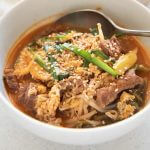
This is a Japanese interpretation of Korean Beef Soup with Rice. Just the right amount of chilli from gochujang (Korean red chilli paste) and Kimchi makes this rice soup slightly spicy and sour.
Prep Time includes time to marinate the beef strips as I assume that you prepare other ingredients while the beef is marinating.
Don't forget to see the section 'MEAL IDEAS' below the recipe card! It gives you a list of dishes that I have already posted and this recipe that can make up a complete meal. I hope it is of help to you.
- 50g / 1.8oz kimchi (note 2)
- 2 stalks shallots diagonally cut into 6cm / 2⅜” long pieces
- 70g / 2.5oz bean sprouts
- 30g / 1.1oz garlic chives cut into 6cm / 2⅜” long pieces
- 1 egg lightly beaten
- 230g / 8oz cooked rice (short, medium or long grain rice, 1½ Japanese serving bowls)
- ½ clove garlic minced
- 1 tbsp gochujang (Korean chili paste, note 3)
- 1 tbsp soy sauce
- ½ tbsp sesame oil
- Roasted white sesame seeds
-
Mix all the Marinade ingredients in a bowl. Add the beef strips to the marinade and massage well. Leave for minimum 10 minutes (note 4).
-
If kimchi vegetables are large, cut into bit size pieces.
-
Add sesame oil and garlic in a pot, cook until aroma of garlic comes out. Add the marinated beef, including the marinade and cook until the colour of the beef changes.
-
Add water and konbu and bring it to a boil. Reduce the heat to minimum and remove the konbu. Cook for 10 minutes. Remove scum occasionally as it comes up.
-
Add Kimchi, shallots and bean sprouts to the pot and cook for 30 seconds. Add soy sauce, sugar, salt and a pinch of pepper. Mix. Taste test and adjust with salt (note 5).
-
Add garlic chives, then spread the egg over the soup. When the egg is half cooked, turn off the heat, place a lid on to cook the egg with the residual heat of the soup.
-
Place cooked rice in serving bowls, pour the soup over the rice and sprinkle sesame seeds over.
1. Since you cook the beef only for 10 minutes or so, I would recommend using a tender cut of beef such as rib eye, sirloin and tenderloin.
2. Kimchi is a spicy Korean pickled vegetable, most commonly made with Chinese cabbage/nappa cabbage. You can buy kimchi at Asian grocery stores.
Use either store-bought kimchi or the home-made kimchi that I posted in Simple Kimchi Recipe.
3. Gochujang is a spicy fermented Korean condiment (red chilli paste). It is sold at Asian grocery stores or at some supermarkets.
You can substitute gochujang with sriracha (Thai chilli paste) or doubanjiang/toban-djan (hot Chinese bean paste).
4. I once left the beef marinating overnight because I ran out of time to cook it. It was 100% OK.
5. Depending on the brands, the amount of salt in the kimchi and gochujang may vary. Adjust the flavour to your taste. The flavour of the soup should be slightly strong as it will be poured over the rice.
6. The quantity of vegetables can vary as long as the total amount is similar to the recipe. You can also change/add vegetables, although the vegetables listed here are commonly used in the soup I had in Japan.
Other vegetables include sliced carrot, shiitake mushrooms and Chinese/nappa cabbage.
7. Nutrition per serving, assuming you drink all the soup.
serving: 759g calories: 587kcal fat: 27g (42%) saturated fat: 8.8g (44%) trans fat: 0.0g polyunsaturated fat: 4.3g monounsaturated fat: 11g cholesterol: 159mg (53%) sodium: 17393mg (75%) potassium: 760mg (22%) carbohydrates: 56g (19%) dietary fibre: 3.5g (14%) sugar: 15g protein: 30g vitamin a: 17% vitamin c: 31% calcium: 7.8% iron: 33%